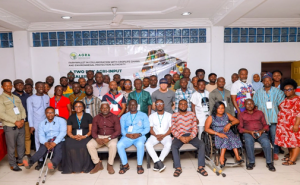
By Elizabeth PUNSU, Ejisu
CropLife Ghana, in partnership with Farm Wallet and with support from the Alliance for a Green Revolution in Africa (AGRA), has begun a national initiative aimed at strengthening the country’s rice value chain through improved input management, digital finance access and enhanced market linkages.

The programme, themed ‘Enhancing the Competitiveness of Rice Production, Processing and Marketing in Ghana’, is designed to boost productivity and reduce the country’s dependence on imported rice by equipping agro-input dealers and farmers with the knowledge, tools and technology needed to improve efficiency and profitability across the rice sector.
Speaking to B&FT at a two-day training for some Agri-input dealers including persons with disabilities in Kumasi, Executive Director-CropLife Ghana Rashad Kadiri said the training component focuses on agricultural input dealers who play a pivotal role in the productivity chain.
“Access to quality inputs such as pesticides, fertilisers and seeds is critical to improving rice yields. But equally important is ensuring that dealers understand the nature of products they sell so farmers can apply them safely and effectively,” he explained.
Mr. Kadiri expressed concern about the growing threat of counterfeit and unapproved Agri-inputs on the market, which continue to undermine farm productivity and endanger food safety.
“It was surprising that some dealers were unaware of the Environmental Protection Agency’s (EPA’s) register of approved products. These documents are readily available on the EPA website and CropLife regularly circulates them to member-companies and dealers,” he said.
To address the issue, CropLife Ghana is partnering with the Environmental Protection Agency (EPA) to introduce an E-Submission Platform for pesticide registration.
“This new digital platform will replace the current manual system, enable more transparent registration and help to detect counterfeit and mimicked products in the market. We believe this digitalisation effort will help streamline regulatory processes and strengthen oversight in the sector,” he said.
For his part, Chief Executive Officer (CEO)-Farm Wallet Adam Mohammed Muhideen noted that the platform is transforming how farmers access finance and markets.
“We are digitising the traditional Village Savings and Loans Associations (VSLA), allowing farmers to save, borrow and access credit directly through the Farm Wallet platform. It also serves as a digital marketplace where farmers can source inputs, access mechanisation services and connect with buyers – creating a seamless value chain that drives competitiveness,” he explained.
According to Mr. Mohammed Muhideen, the partnership will see 50 input dealers trained and onboarded at the initial stage in Ashanti Region, with a broader target of 5,000 dealers across all 16 regions over the next three years.
“The project benefits both farmers and dealers. Dealers gain access to a wider customer base of over 10,000 smallholder farmers on our platform, which helps boost their sales and operational efficiency,” he said.
Latest figures from the Ministry of Food and Agriculture (MoFA) show that Ghana’s annual rice demand stands at about 1.4 million metric tonnes, with domestic production meeting just over 60% of consumption needs. The country still spends between US$400million and US$600million annually on rice imports, underscoring an urgent need for initiatives that can close the production gap and strengthen local value chains.
The post CropLife, Farm Wallet partner to drive rice sector competitiveness appeared first on The Business & Financial Times.
Read Full Story

















Facebook
Twitter
Pinterest
Instagram
Google+
YouTube
LinkedIn
RSS